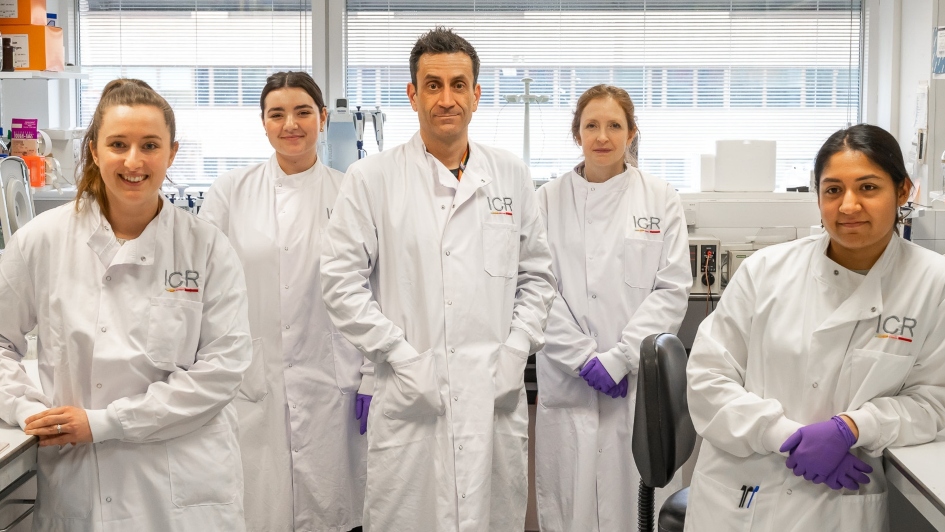
Image: Professor Chris Jones with his team in the lab. Credit: Brain Tumour Research
The charity Brain Tumour Research has today announced a £2.5m funding agreement to help find new treatments for the deadliest of all childhood cancers.
The grant is being awarded to The Institute of Cancer Research, London, where a team of scientists led by Professor Chris Jones, will form the charity’s fourth Brain Tumour Research Centre of Excellence.
The Centre has ambitious plans to identify new treatments for high-grade glioma brain tumours occurring in children and young adults. The Centre will act as a crucial bridge connecting worldwide research and analysing findings which will help inform and enable the setting up of much-needed clinical trials.
Just last month a hard-hitting report from the All-Party Parliamentary Group on Brain Tumours identified that the current funding system for research into the disease, the biggest cancer killer of children and adults under the age of 40, had been built in silos and needed to be joined up from basic science through to clinical trials.
It also recommended that funding bodies should ring-fence specific funding for research into childhood brain tumours where survival rates for the most aggressive tumours had remained unchanged for decades, leading to frustrated families seeking costly and unproven treatment abroad.
An international hub for the development of new treatments'
Dr Karen Noble, Director of Research, Policy and Innovation, at Brain Tumour Research, said: “The announcement of our fourth Centre marks a major step towards our vision of finding a cure for all types of brain tumours.
“Under Professor Jones’s leadership, an experienced team at the newly-created Brain Tumour Research Centre of Excellence at the ICR will lead the way in scientific research into paediatric-type diffuse high-grade glioma brain tumours such as high-grade diffuse-midline glioma, including DIPG. We are extremely grateful to our loyal supporters whose fundraising has made this milestone possible.
“This Centre will act as an international hub for the development of new treatments for children and young adults with these terrible brain tumours. Improving outcomes for children with these types of tumour is crucial if we are to make progress and bring much-needed hope to so many.”
Smarter, kinder treatments
Professor Jones, Professor of Childhood Brain Tumour Biology at The Institute of Cancer Research, London, said:
“We are delighted that Brain Tumour Research is backing our research into finding better treatments for children with brain cancer. These tumours are incredibly resistant to current treatments and children are in desperate need of new options.
“Our lab is working day in, day out to unravel the underlying biology of these dreadful tumours, and hopefully uncover new ways to attack them. This invaluable support from Brain Tumour Research will help to fuel new discoveries and pave the way to smarter, kinder treatments for children diagnosed with brain tumours.”
- Paediatric-type diffuse high-grade glioma (PDHGG) are a collection of brain tumours in children and young adults with an extremely poor clinical outcome
- For some subtypes less than 5% of patients survive more than two years
- Median survival for the vast majority of these tumours is just nine – 18 months
Among those welcoming the news was Niki O’Dea Patel from Bedfordshire who lost her son Shayen to a high-grade brain tumour in September 2020, less than two years after his diagnosis.
“As a parent told your child has a brain tumour, you assume in this day and age there will be something to increase the odds and give you hope. The harsh reality is with this type of tumour there are no such treatments,” she said.
“I can’t believe that funding for research into brain tumours continues to be so poor. I am delighted that Brain Tumour Research is funding this important work but we will continue to press for the Government to act now and increase investment to help charities fighting to find a cure for this devastating disease.”
The new Centre will generate laboratory data to support new clinical trials and will span the gap between basic biology and clinical benefit for children and young adults with high grade glioma. Crucially, the best ideas from the lab and others, as well as from drug companies, will be assessed and those most likely to be beneficial to patients will be selected. The Centre will help prioritise the most promising approaches for clinical translation within established clinical trial platforms across a worldwide consortium.
The ICR was chosen from a strong field of applicants following a robust peer review process. It joins Brain Tumour Research Centres of Excellence at the University of Plymouth, Queen Mary University of London, and Imperial College and taking the charity another step towards its goal of creating a network of seven sustainable Brain Tumour Research Centres of Excellence across the UK.
Brain Tumour Research funds sustainable research at dedicated centres in the UK. It also campaigns for the Government and the larger cancer charities to invest more in research into brain tumours in order to speed up new treatments for patients and, ultimately, to find a cure. The charity is the driving force behind the call for a national annual spend of £35 million in order to improve survival rates and patient outcomes in line with other cancers such as breast cancer and leukaemia.